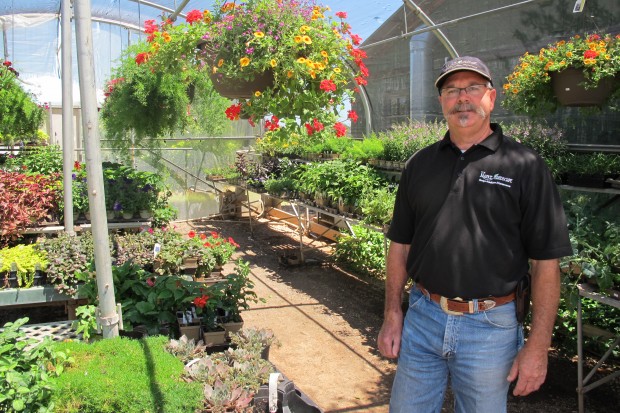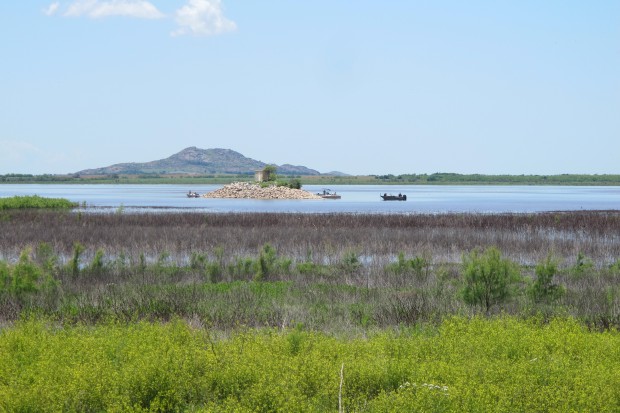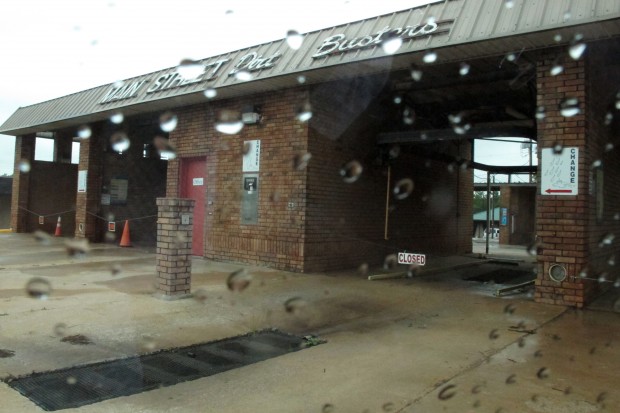
Craig Nance, owner of Nance Landscaping in Altus, Okla. says he hasn't done a landscaping job in Altus in three or four years because of the drought.
Logan Layden / StateImpact Oklahoma


Craig Nance, owner of Nance Landscaping in Altus, Okla. says he hasn't done a landscaping job in Altus in three or four years because of the drought.
Logan Layden / StateImpact Oklahoma

Logan Layden / StateImpact Oklahoma
Craig Nance, owner of Nance Landscaping in Altus, Okla. says he hasn't done a landscaping job in Altus in three or four years because of the drought.
May 2015 already ranks as one of the wettest in state history, and continues to snuff out the four-year drought that dried up cities in southwest Oklahoma. Water rationing helped keep Duncan, Lawton and Altus afloat, but those cities are now scaling back their water-saving mandates.
In Altus on May 19, the city council thanked God for the recent wet weather, and asked for the knowledge to be good stewards of this new bounty of water.
And to many people in Altus, it does feel like a miracle has happened. Craig Nance lives just outside town among greenhouses and young trees, all bursting with life. He says residents have been streaming to area lakes just to take a look at them.
“It’s a parade. And it’s fun to watch,” he says. “People are just driving to the lakes to see the water level. Gotta see it to believe it.”
He runs Nance Landscaping, which serves all of southwest Oklahoma. Being a landscaper during a drought isn’t easy.
“In Altus I can tell you I haven’t done a landscape job in the last four or five years there,” Nance says. “And I’m honest with people. They’d like to have landscapes, but when you can only water them once a week, it’s not sustainable.”
Yes, southwest Oklahoma is green again, but for how long? J.D. Strong, the executive director of the Oklahoma Water Resources Board, worries Oklahomans will fall back into old habits.
“What we hope doesn’t happen is what often happened in the past, which is once the rain comes and the drought begins to subside, most people tend to slip back into this apathetic tendency to just waste water and think that we’ve got abundant water and we don’t need to aggressively conserve that water resource,” Strong says.

Logan Layden / StateImpact Oklahoma
Rising water levels inundate vegetation that was growing on the exposed lakebed at Tom Steed Lake near Altus, Okla.
City leaders in Duncan, Lawton, and Altus know they’re just one dry summer away from being right back in a crippling drought, but water restrictions hinder growth and blow big holes in city budgets. Duncan has been under stage 5 water restrictions, meaning no outdoor watering, empty swimming pools, and restricted hours for commercial car washes. Saving all that water has cost a lot of money.

Logan Layden / StateImpact Oklahoma
Duncan, Okla. City Manager Jim Frieda says his city is pushing forward with long-term projects to reduce the burden of future droughts.
“I can basically tell you that what the conservation projects cost the city was about a $7 million in revenues,” says Duncan City Manager Jim Frieda . “We went from average daily use of about 4.5 million to average daily use of about 2.5 million gallons.”
Duncan last week moved from stage 5 to stage 4 water restrictions, and Frieda says he expects to move to stage 3 soon, which would allow outdoor watering twice a week.
At the Altus City Council meeting on Tuesday, Mayor Jack Smiley was wringing his hands over having to move from stage 3 to stage 2, and allow outdoor watering every other day.
“I have found no citizen that’s in favor of coming out of stage 3 and moving to stage 2,” Smiley told the city council. “But I’m asking you, please, don’t put me in this position.”
These water restrictions are based on how much water is in city lakes. They’re supposed to trigger automatically, but all of the Altus council members wanted to keep current water limits in place, and were frustrated by the lack of flexibility in the city’s water rationing ordinance.
Eventually, the council amended the city ordinance to remain at Stage 3.

Logan Layden / StateImpact Oklahoma
A closed car wash in Duncan, Okla. Under stage 5 water restrictions, commercial car washes had to cut their hours of operation.
The situation in Lawton was getting desperate before the rain came. Assistant City Manager Jerry Ihler says the city was probably just a couple of days away from going into stage 4.
Now, Lawton has dropped all mandatory water restrictions. Still, the southwest Oklahoma city will push forward with plans to dredge Waurika Lake and drill new groundwater wells to supplement their water supply. That’s the plan in Duncan and Altus as well.
“So you diversify your stock portfolio. Well, we’re looking at our water portfolio,” Ihler says. “And we have three lakes — surface water — and now we want to go ahead and expand our portfolio and include groundwater through wells and also reuse water.”
So, at least for now, these southwestern Oklahoma cities aren’t ready to fritter away their newfound water wealth.